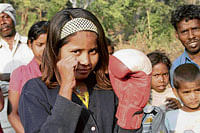
The Birhors are one of the most backward tribes of Jharkhand. They are nomads and depend on the forests for their livelihood. Most Birhor children do not have the benefit of education, and poverty is the only way of life they have known. The girls of this community spend their days cooking for the male members of the family, taking care of their younger siblings and assisting the elders in making ropes out of tree bark.
But Malti and Dulali Kumari are different.
Though both the 12-year-olds still cook and clean and contribute to all the other daily chores in their homes in the remote village of Chilkari, located near Topchachi hills in Dhanbad district, they are role models for other girls in the community for being able to fight — quite literally — for a better life.
Both girls have donned boxing gloves and are state amateur champions. Just last year their team won the gold medal in the state boxing amateur championship in Jamshedpur.
The girls neither have access to basic amenities nor education, so how did they make it to the boxing ring? They were keen on boxing after the boys of their community started showing interest in taking up boxing to further their hunting skills.
“We found that their good physique and wrist strength was apt for the sport,” says Ashutosh Kumar Mairh of Samvedna, a self-help group of young teachers and students of Dhanbad, which has been training the girls along with the boys of the community.
Today, Malti, Dulali, their friend Suman and 18 other girls — all between 12 and 14 years — aspire to be successful professional boxers.
Till recently, their skills were limited to catching rabbits, cooking rice in mud pots and making ropes. Now, Malti says, “I want to go to (the) town to box. And when I grow up, I want to be a trainer.”
A little distance from Malti’s house, Suman is practising hard in the courtyard of her modest home. Brimming with confidence, she says: “I will grow up to be a boxer. We have got the talent that people in the cities do not have.”
After Malti, Dulali and Suman made it to the state championship they have become celebrities! Even as they bask in their new-found glory they continue to get up early in the morning to cook, clean and make ropes. Come evening, nothing can stop them from putting in a few hours of boxing practice. Dressed in their everyday wear, they don their boxing gloves and practise the only game they have learnt from “professional trainers from the city”.
Suman says, “I no longer play with dolls. Even with our friends we are only boxing. This is the new sport we love to play these days.”
Mairh, the man who introduced the girls to people in the local boxing association, says: “It was the plight of these neglected but hard working people that led me to believe that they have it in them to change their lives for the better.”
The Birhor community is dwindling — at last count they numbered 3,500. Their expertise lies in making ropes from tree bark, but with changing times they have started buying or picking up used plastic cement bags, removing the stitches and using the plastic to make ropes. The bags are either bought for Rs 2 each from the local market or picked up from contractors. The women make the rope, popularly known as sutli (soft rope), which is either sold as it is or woven into nets and retailed in the local haat (market). This earns them Rs 25 or Rs 30 a day.
Now, boxing has brought a new energy to the youngsters. Lalan Birhor says, “It is true we knew nothing beyond hunting in the jungles. We have been friends of the jungle. But now with this new talent of ours, our girls feel good.”
Paritosh Kumar, Secretary of the Dhanbad District Amateur Boxing Association, says: “We are training these girls because we believe they are better than others in learning the art of boxing. With their hunting skills and experience of living in tough conditions, they possess the right talent for boxing.”
At his behest the association is now sponsoring Birhor girls and boys who want to take up boxing in a bigger way.
“We started training them after we found that the community did not have access to even basic food. We noticed their natural talent for climbing hills, negotiating the jungles and weaving nets. Their wrist strength is immense and we are very impressed. We know one day these girls will make us proud,” says Paritosh.